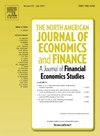The link between energy prices and stock markets in European Union countries
IF 3.9
3区 经济学
Q1 BUSINESS, FINANCE
North American Journal of Economics and Finance
Pub Date : 2025-03-20
DOI:10.1016/j.najef.2025.102420
引用次数: 0
Abstract
The paper examines the relationship between the energy sector and the stock market, specifically analyzing how fluctuations in energy prices, such as oil and gas, influence the returns of major European stock indices. The analysis is conducted at the level of European Union (EU) countries, considering both individual country-specific dynamics and group-level effects based on various criteria, such as geographical region and industrial development.
Although EU countries share several common economic characteristics, the findings indicate that the impact of energy prices on stock markets varies significantly across states. Additionally, the results highlight that energy price dynamics affect countries with the highest levels of industrial production differently compared to the rest of the EU.
From a quantitative perspective, the study explores both the co-movement between variables and the effects of various economic shocks. Furthermore, it examines the dynamic linkages between energy and stock markets by employing models such as the Dynamic Conditional Correlation (DCC) model, the Time-Varying Parameter Vector Autoregressive (TVP-VAR) model, and the Markov-Switching model to capture regime-dependent changes in the relationship between energy prices and stock market returns.
欧盟国家能源价格和股票市场之间的联系
本文考察了能源部门和股票市场之间的关系,具体分析了能源价格(如石油和天然气)的波动如何影响欧洲主要股票指数的回报。分析是在欧洲联盟(EU)国家一级进行的,考虑到根据地理区域和工业发展等各种标准的个别国家具体动态和集团一级的影响。尽管欧盟国家有几个共同的经济特征,但研究结果表明,能源价格对股票市场的影响在各国之间差异很大。此外,研究结果强调,与欧盟其他国家相比,能源价格动态对工业生产水平最高的国家的影响有所不同。从定量的角度,研究了变量之间的共同运动和各种经济冲击的影响。此外,它还通过采用动态条件相关(DCC)模型、时变参数向量自回归(TVP-VAR)模型和马尔可夫转换模型等模型来考察能源价格和股票市场回报之间关系的动态联系,以捕捉能源价格和股票市场回报之间关系的制度依赖变化。
本文章由计算机程序翻译,如有差异,请以英文原文为准。
求助全文
约1分钟内获得全文
求助全文
来源期刊
CiteScore
7.30
自引率
8.30%
发文量
168
期刊介绍:
The focus of the North-American Journal of Economics and Finance is on the economics of integration of goods, services, financial markets, at both regional and global levels with the role of economic policy in that process playing an important role. Both theoretical and empirical papers are welcome. Empirical and policy-related papers that rely on data and the experiences of countries outside North America are also welcome. Papers should offer concrete lessons about the ongoing process of globalization, or policy implications about how governments, domestic or international institutions, can improve the coordination of their activities. Empirical analysis should be capable of replication. Authors of accepted papers will be encouraged to supply data and computer programs.

 求助内容:
求助内容: 应助结果提醒方式:
应助结果提醒方式:


